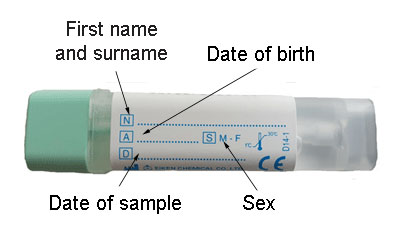South West London Pathology (SWLP) provides the symptomatic FIT testing service for Croydon.
If you are a GP in Croydon and would like to report an issue or request further information please email: SWLPBusinessDevelopment@stgeorges.nhs.uk.
Ordering FIT testing kits
You can order more FIT testing kits by emailing
SWLPBusinessDevelopment@stgeorges.nhs.uk.
About the Faecal Immunochemical Test (FIT)
The Faecal Immunochemical Test (FIT) is a type of faecal occult blood test which uses antibodies that specifically recognise human haemoglobin (Hb). It is used to detect and quantify the amount of human blood in a single stool sample.
Those with a higher risk of both colorectal cancer and of high risk adenoma should be referred urgently using the Croydon FIT pathway.
FIT is given to patients to carry out at home and return to their GP. Patients will receive:
- the specially-designed test tube
- a patient information leaflet
- a referral form which needs to be kept with the sample when it is sent to the lab
- a green plastic pouch for the test tube with the sample and the referral form.
The turnaround time for FIT results by SWLP is 48 hours.
FIT can be used for cancer screening or for symptomatic patients. The guidance below refers to tests offered to symptomatic patients.
Who should have the FIT test?
NHS Croydon CCG as part of RM Partners, the west London Cancer Alliance, have committed to using FIT as a triage tool prior to any onward referral for patients with suspected colorectal cancer symptoms.
The FIT test can be requested in any symptomatic bowel patients that qualify for referral under the two week rule with suspected cancer. This builds on the adoption of the use of FIT for low risk symptomatic patients (DG30) that commenced in January 2019.
FIT should be used for patients with any of the following criteria:
- any age with suspicious / unexplained abdominal mass
- ≥ 40 years with unexplained abdominal pain and weight loss
- any age with unexplained iron deficiency anaemia
- ≤ 50 years with rectal bleeding with any of the following unexplained symptoms:
- abdominal pain
- change in bowel habit
- weight loss
- iron deficiency anaemia (attach results)
- ≥ 50 years with unexplained rectal bleeding
- ≥ 50 years with unexplained abdominal pain or weight loss
- any age with unexplained change in bowel habit
- ≥ 60 years with unexplained anaemia even in the absence of iron deficiency.
For patients with anal ulceration or rectal mass suspicious of cancer detected by physical examination, patients can be referred under the two week rule without a FIT test, using the existing 2WW – Colorectal /Lower GI Telephone Assessment (straight to test) at Croydon University Hospital.
Patients with rectal bleeding alone <50 years should be referred via the rectal bleeding pathway.
For any other symptoms or those younger than 40 years, please consult the Chronic Lower Abdominal Symptom Pathway <40 years with other symptoms pathway.
Benefit of FIT
Benefit for patients:.
- The patient experience will be improved as the patients will not need to have unnecessary invasive diagnostic tests but the majority will instead be re-assured they do not have cancer by a self-administered FIT test
- This means FIT negative patients will not need to take time off to visit the hospital and it will reduce their anxiety.
Benefit for general practitioners:
- More patients with bowel cancer can be identified at an early stage.
- Primary Care clinicians will be able to help and support patients locally without unnecesary referrals to hospital.
- Better management of demand for referrals.
Administering the test
1. Once the patient has opened their test pack they need to write their (N) first name and surname, (A) date of birth, (D) date of collection, (S) gender on the test tube label.

2. It is advised that the referring GP look at to the instructions and explain to the patient how to collect the stool sample without it being contaminated with the water in the toilet bowl.
3. GP must complete the request form on Sunquest ICE.
4. Give the test pack to the patient and advise them to read the instructions carefully before they complete the test and return the pack, which should contain the test tube and request form, to the practice within three working days.
Interpreting the results
FIT negative/normal: These patients have a low risk both of colorectal cancer and of high risk adenoma. However, in patients with persisting symptoms of significant concern, specialist advice should be considered in line with local arrangements.
FIT positive/abnormal: These patients have a higher risk both of colorectal cancer and of high risk adenoma. Refer using 2WW Croydon FIT Pathway.
Patient information leaflets
The patient information leaflet is available in 12 languages.
Key documents
Below are links to the key documents for the FIT service. For the full documentation, please see the Croydon DXS system.
Download
Further information
Below are links to useful information about FIT:
